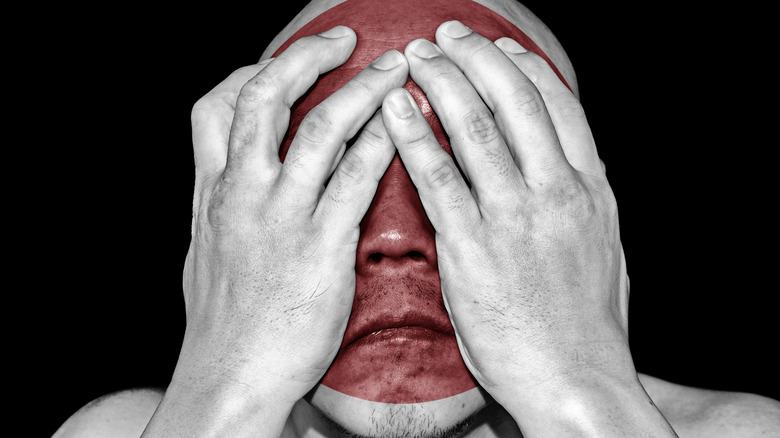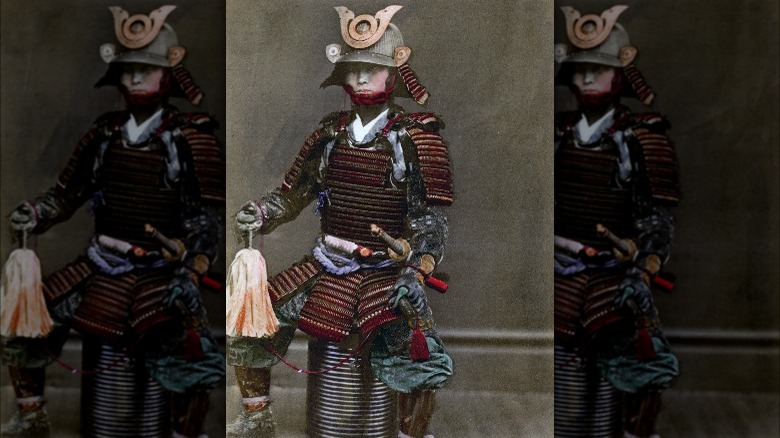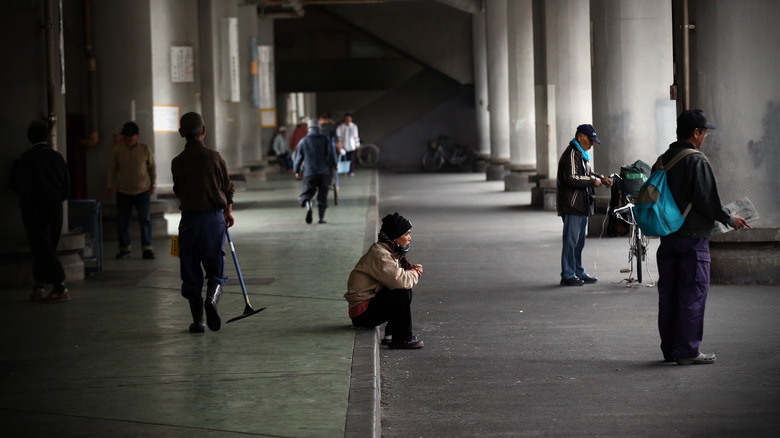The Truth About The Japanese Who Choose To Go Missing
The idea of starting an entirely new life and leaving everything and everyone you know and love behind is probably something many people have thought about when life seems overwhelming. Certainly it was easier in ages past; tougher in today's ultra-connected times. Nevertheless, some have pulled it off, specifically in Japan, where there are companies that provide the service of helping people leave their old lives and start new ones. The people who look to disappear are called Johatsu, which means "evaporated people," according to the BBC. The New York Post reported that since the mid 1990s an estimated 100,000 people vanish in Japan per year.
It's hard to wrap your mind around that many people purposely leaving their families, jobs, homes and friends, but there are a couple of things at play in Japanese culture.
First, according to the New York Post, privacy is so protected in Japan that things used to trace people in the U.S. — like financial transactions — are illegal for police to access. There is no national database of missing people in Japan, and no social security numbers. Essentially, police won't look for you unless there is reason to believe there was a mishap, a suicide, or a crime, so if you don't want to be found, you most likely won't be.
Sociologist Hiroki Nakamori told the BBC, "Police will not intervene unless there's another reason — like a crime or an accident. All the family can do is pay a lot for a private detective. Or just wait. That's all."
A culture of shame
French journalist Léna Mauger spent five years researching the phenomenon in Japan. "It's so taboo," Mauger told The New York Post. "It's something you can't really talk about. But people can disappear because there's another society underneath Japan's society. When people disappear, they know they can find a way to survive."
While privacy laws and companies that help people abandon their former lives facilitate the vanishings, the reason behind them have more to do with Japan's longstanding cultural ideals around duty and obligation, and the shame that comes with falling short. According to an essay by professor Takako McCrann Ph.D, published on PBS called "Shame, Honor and Duty" (posted on PBS), the Japanese code of conduct still driving culture today began with the samurai who developed the code between the 11th and 14th centuries.
McCrann writes, "In Japan, relationships between people are greatly affected by duty and obligation. In duty-based relationships, what other people believe or think has a more powerful impact on behavior than what the individual believes ..." Shame is a powerful motivator, McCrann writes. "In Japanese culture, shame cannot be removed until a person does what society expects, which may include drastic measures such as committing suicide. For example, if you are falsely accused of a crime, your guilt will be removed when you are proven innocent in court, but shame will stay as long as other people are suspicious of your actions or think negatively of you."
'You must hit the nail that stands out'
Shame is a big driver of those who choose to "evaporate," but according to Time, those who simply don't feel like they are fitting into society will also disappear, whether it be depression, sexual deviancy, or addiction. Other times people are leaving abusive situations, unhappy marriages, or mounting debt. Yet at the heart of those issues is, again, shame — the shame of not being able to do what is expected of you, or be who you are expected to be. The New York Post reported that a Japanese saying is, "You must hit the nail that stands out," an expression of their expectation that all people conform to societal expectations.
According to what Nakamori told the BBC, rather than deal with the problems, "In Japan, it's just easier to evaporate."
But choosing to disappear comes with its own issues. According to the BBC, one man who left his wife and children because he said he "got fed up with human relationships," and the pressures he felt in the small town he lived in to take over his family's business, all got to be too much. A year after he walked away he told the BBC, "I constantly have a feeling that I've done something wrong." Not only are there regrets, but for some, the new life is something like a penance in a city that has been itself erased from relevance to the rest of Japan.
The afterlife
The New York Post describes a place where many of the Johatsu end up: the city of Sanya, which is a Tokyo slum that has itself been erased from any maps. It's largely run by the Japanese mafia and employers who are looking for people to work for low pay, off the record. The people who left their former lives often live in small hotel rooms, some without windows, where they spend their days just getting by.
Per the Post, one man who spends most of his time drinking and smoking said, "After all this time, I could certainly take back my old identity ... But I don't want my family to see me in this state. Look at me. I look like nothing. I am nothing. If I die tomorrow, I don't want anyone to be able to recognize me."
Another man disappeared amid the shame of not being able to afford to take care of his aging mother. "You see people in the street, but they have already ceased to exist," he said. "When we fled from society, we disappeared the first time. Here, we are killing ourselves slowly."



